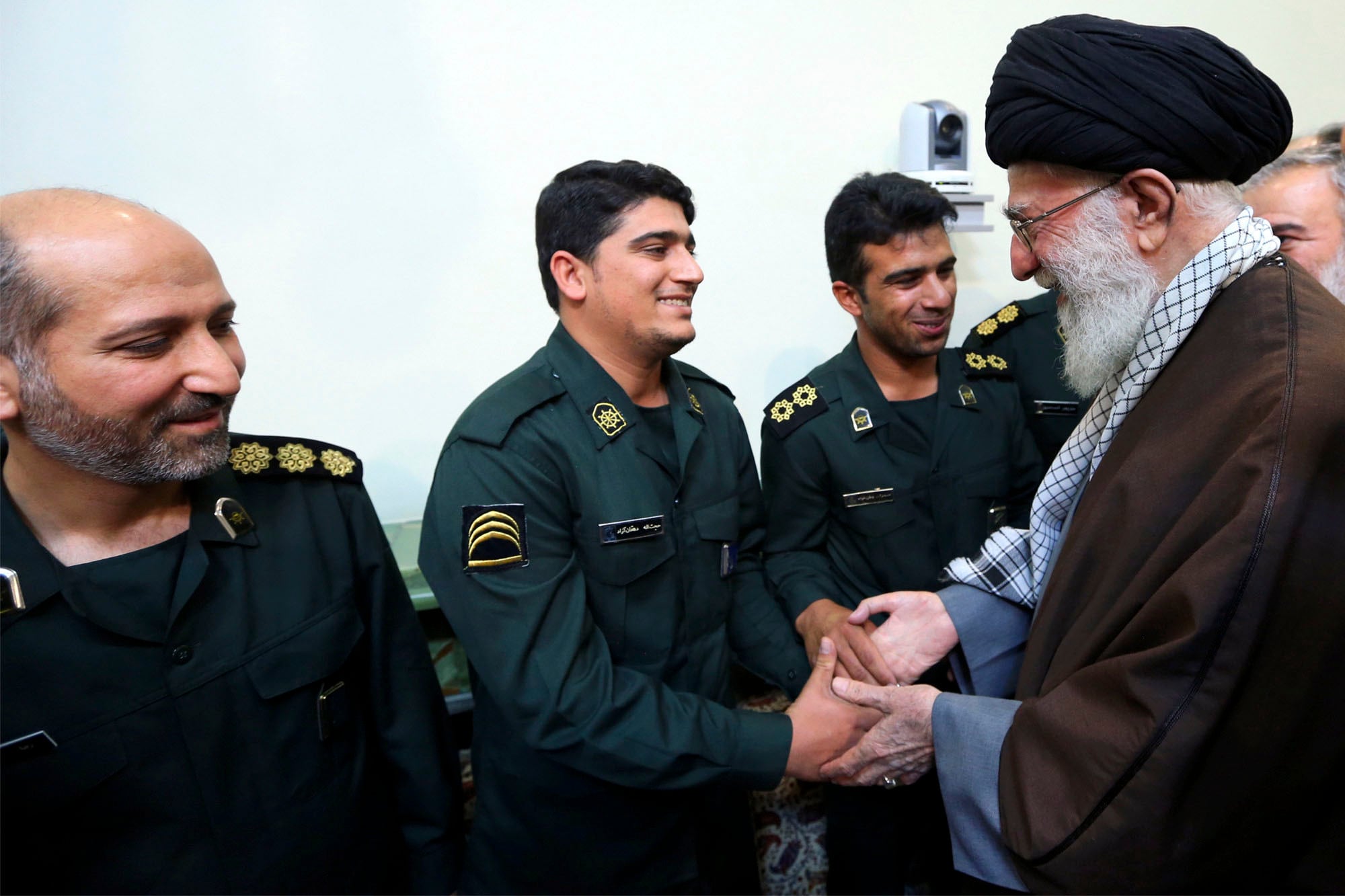Iran’s supreme leader is hailing his hard-line paramilitary forces as heroes for their arrest of 10 American sailors at gunpoint, but an emerging consensus of U.S. legal experts believe the provocative act was a dangerous violation of international law that has so far gone without repercussions. that Iran appears to have flagrantly violated international law without penalty. an emerging trumpet’s the seizure of two U.S. vessels and the arrest of 10 sailors as the work of God, lawmakers, legal experts and Navy officials worry that the incident set a bad precedent for the rule of law on the high seas, making sailors less safe.
The U.S. riverine boats had the right to pass expeditiously through Iran's territorial waters under the right of innocent passage without being boarded and arrested, so long as they weren't engaged in a military operation such as spying. Pentagon officials have said the riverine boat crews mistakenly entered Iran's waters in the Persian Ggulf due to a "navigation error" while en route to a refueling.
Their arrests nearly derailed the months of nuclear deal negotiations with Iran and U.S. officials quickly secured the sailors' release. But only hours after their release, Iran's hardliners released propaganda videos of the sailors in custody. As of Jan. 27, the U.S. has not formally protested their treatment.
Iran did not have the legal standing to arrest the sailors at gunpoint and that demands a U.S. legal response, said one expert., an act that raises questions about whether the U.S. has done enough so far to rebuke Iran.
"This should be very concerning for the Navy community that this was not given a greater importance," said James Kraska, a maritime law expert at the U.S. Naval War Collegesaid n, arguing that the administrations weak response to the incident constitutes a failure to enforce international norms. "This says that U.S. vessels don’t have innocent passage and that their sovereign immunity is not respected."
Almost as soon as the news broke that Iran had arrested the 10 sailors, the Navy and Obama Administration were assuring the public that Iran was planning to release the sailors and their equipment soon, the result of improved relations as a result of the recent Iran nuclear deal.
As news of their arrests broke Jan. 12, the Obama administration assured the public that they would get Iran to release the sailors rapidly as part of thawing relations with the country over the nuclear deal. The sailors were freed after nearly 16 hours in captivity on Farsi Island and drove off in their riverine boats. The next day, On Jan. 14, Secretary of State John Kerry publicly thanked Iran for its gracious treatment of the captured sailors, providing them with food and blankets. But within hours, Iran circulated images that showed the sailors surrendering at gunpoint, as well as a video where one of them apologized., but within hours Iran was circulating images of the captured sailors on their knees, hands over their heads, as well as a video of one of the sailors appearing to apologize for entering Iranian waters.
The U.S. has expressed discontent through diplomatic channels over Iran's handling of the incident, the use of the sailors for propaganda and Iran's flouting of international norms, a State Department official said.
"We have expressed our strong concern to Iran over the incident," the official said, but declined to go into detail about those concerns, who relayed them or whether Iran could face further repercussions. what steps the State Department took to voice those concerns.
The legal experts referenced the is based upon the Legal experts cite the Under the U.N. Convention on the Law of the Sea, which the U.S. abides by and Iran has signed but not ratified. Under it, a warship has "sovereign immunity" and can transit the territorial waters of another so long as they move "continuously and expeditiously" and do not conduct any military operations, said Craig Allen, a professor of marine and environmental affairs at the University of Washington School of Law.
Iran had the right to query the U.S. assault boats estion the sailors and if they didn’t like their answer, they had the right to expel them from their waters. But they didn't have the right to arrest them. like what they were doing in Iran's waters, there, had the right to expel the sailors from their waters.
"They can say 'You are no longer conducting an innocent passage, get out,'" Allen said. "You expel them — you don't haul them into your port."

In this picture released by official website of the office of Iranian supreme leader on Jan. 24, Supreme Leader Ayatollah Seyed Ali Khamenei greets a group of Revolutionary Guard officers who were involved in the detention of U.S. Navy sailors in Iranian water earlier this month, during their meeting in Tehran, Iran.
Photo Credit: Office of the Iranian Supreme Leader via AP
Unsettled issue
The Law of the Sea rules also give vessels in distress the right to stop or drop anchor to make repairs. In this case, Iran could have approached to offer assistance, but they had no right to board and should not have arrested the sailors and seized the high-tech riverine command boats, said Kraska, the Naval War College expert. Iran's Revolutionary Guard Corps proceeded to rifle through the 49-foot-long boats for secrets and technology.
Iran does not claim the U.S. was doing anything against the law in its territory, but that the sailors should have asked permission before entering Iran's waters, according to Julian Ku, a Hofstra law professor who wrote on the incident for the influential legal blog "Lawfare."
"Iran's interpretation of the innocent passage doctrine finds little support under the text of UNCLOS and it has been squarely rejected by most major seafaring nations, including both the U.S. and the then-Soviet Union," Ku wrote. "Indeed, such a restrictive reading of innocent passage effectively undermines the whole purpose of the doctrine."
If the vessel is in distress, it can stop or anchor to make repairs. The nation whose waters the ship has entered has the right to approach the vessel, can render assistance if invited to, but may never board and certainly should not have arrested the sailors and seized the boats, said James Kraska, a professor at the U.S. Naval War College in Rhode Island and an expert in international maritime law.
The Navy clams that one of the boats had mechanical issues and couldn't escape into international waters fast enough, though it's unclear why the other boat didn't just tow them out.the
Critics have assailed the Obama administration's handling of the tense stand-off, saying their so far failure to rebuke Iran emboldens adversaries and puts sailors in the Persian Gulf and elsewhere at risk. Lawmakers and legal experts say the administration hasn’t been tough enough on Iran for what they claim was a flagrant violation of international law, and that the lack of a firm stance on the issue emboldens America’s adversaries and imperils sailors operating in the Persian Gulf and elsewhere around the globe.
"The Obama administration's failure to affirm basic principles of international law places our Navy and Coast Guard vessels and the men and women who sail them at increased risk in the future," said Sen. John McCain, R-Arizona, chairman of the Senate Armed Services Committee, in a statement to Navy Times.
However, the Obama administration points out that it secured the sailors' freedom within without hours and that they haven't ruled out rebuking Iran, once the Pentagon's investigation concludes.
But the Admiration pushes back on the notion that the Administration hasn't been tough enough or stood up for sailor's rights on the high seas, citing its immediate response to the crisis in securing the fast release of the 10 sailors and their equipment.
"You should also look at the concerted efforts on the part of the senior-most members of this administration to secure the release of these sailors in a matter of hours," said an administration one U.S. official familiar with the negotiations, who asked for anonymity to discuss internal deliberations. official on background. "You may recall that British sailors spent nearly two weeks in Iranian custody when a similar incident of this nature occurred in 2007."
Furthermore, the administration official said, the Defense Department is investigating the incident and couldn't get ahead of those findings.
The outcome of this legal issue may lay an important precedent. The innocent passage is also the right the U.S. Navy has used to dispute what the U.S. says are China's outlandish claims to the South China Sea, and was the authority under which they dispatched destroyer Lassen in late 2015 to patrol near China's man-made islands.
If the U.S. doesn't stand up for its rights in the Persian Gulf, it may have difficulty enforcing rights elsewhere, including in the Asia-Pacific, Ku argues.
"The U.S. cannot allow this incident to set a precedent for other countries," Ku wrote. "What if China seized a U.S. vessel conducting innocent passage in its 'territorial waters'? At the minimum, the U.S. should do far more to clarify whether it views the seizure and detention as legal. Leaving its position on this issue unsettled cannot help — and is likely to seriously hurt — its long-held commitment to uphold freedom of navigation."
At issue is the right of innocent passage, which has been in the news a of because of the stand-off between the United States and China of what the U.S. says are China's excessive claims in the South China Sea.
'That's not done'
Inside the Navy, officials were deeply embarrassed by incident, with early signs mistakes by the riverine boat crews, who cut through Iran's waters, triggered the encounter. They were outraged that Iran's hard-line forces exploited the U.S. captives for to the leadership of the commanearly indications show was the result of some colossal screw-up on the part of the leadership on board the Riverine Command Boats. Furthermore, officials were outraged by Iran use of the sailors for propaganda purposes, which some have said violated the Geneva Convention’s ban on such images.
"Parading those sailors before the media, that's not done under the Geneva Convention, even if you are not at war," Allen said.
Iran has claimed at least one reason to board the ships: Snooping. That constitutes a military operation and removes the protection of innocent passage. Iran claimed initially that the sailors were spying, which if true would have constituted a military operations, and would open the door to more aggressive actions from Iran," said Bryan Clark, a retired commander and analyst with the Center for Strategic and Budgetary Assessments.
"If you are flying UAVs, lighting off military radars or even looking through the big-eyes [binoculars], Iran could claim that was a military operation and the vessel is no longer in innocent passage," said Bryan Clark, a retired commander and analyst with the Center for Strategic and Budgetary Assessments.
The U.S. denied that the sailors were spying on Iran. It still remains murky why the sailors steered through Iran's waters. One Navy official said it's possible the riverine boats went on an ill-advised short-cut to the refueling rendezvous.hat's unclear, however, is what exactly the sailors were doing there -- something a Navy investigation is trying to uncover. Within hours of the sailor's release, a Navy official familiar with the captured sailors' debriefing in 5th Fleet told Navy Times that it seemed the sailors had deviated from track to take a misguided short-cut to a refueling vessel.
"Nobody understands why they did what they did," the official said. "The way they went off course required some notification or approval that they didn't seek."
Indeed, deviating from an approved track is a serious no-no for even senior commanding officers such as cruiser skippers, let alone a riverine command boat convoy led by a lieutenantjunior officer. Another outstanding question is why the sailors didn't try and escape Iranian waters, even ifn one boat was having mechanical issues, by means of a tow.
While the Navy investigates the incident, the Iranian supreme leader Ayatollah Seyed Ali Khamenei has been taking a propaganda victory lap, posting a meme to his English-language Twitter account that called Iran's seizure of the sailors and their boats,"God's deed."
"What you did was very great, interesting and timely," the image says, quoting Khamenei's comments to the Iranian Revolutionary Guard commandos forces who capturedtook the sailors. "And it was, in fact, God's deed that took Americans to our waters so that through your timely job, they raised their hands over their heads and were arrested."
David B. Larter was the naval warfare reporter for Defense News.





